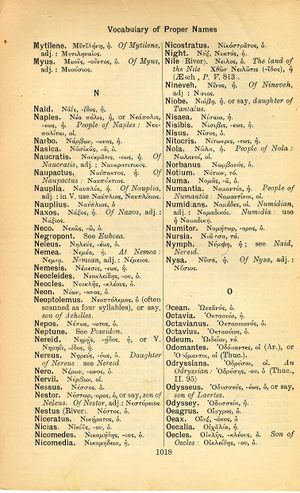Narbo
λέγεις, ἃ δὲ λέγεις ἕνεκα τοῦ λαβεῖν λέγεις → you speak, but you say what you say for the sake of gain (Menander, fr. 776)
English > Greek (Woodhouse)
Νάρβων, -ωνος, ἡ.
Latin > English (Lewis & Short)
Narbo: ōnis, m., and (late Lat.) Nar-bōna, ae, f., also with the appellation Marcius (after the consul Q. Marcius Rex, who led a colony thither A. U. C. 636),
I a city in Gaul, from which Gallia Narbonensis takes its name, the mod. Narbonne.—Form Narbo, Mela, 2, 5, 2; 6; Plin. 3, 4, 5, § 32; Cic. Font. 1, 3; 16, 36; Vell. 1, 15, 5; 2, 8, 1.— Form Narbona, Capitol. Max. et Balb. 5, 8; Eutr. 4, 23; Inscr. Orell. 218.—Hence,
A Narbōnensis, e, adj., of or belonging to Narbo, Narbonian: colonia, Cic. Brut. 43, 160; id. Clu. 51, 140: coloni Narbonenses, Cic. Font. 2, 14: Gallia, the province of Gaul beyond the Alps, Mela, 2, 5, 1; Plin. 4, 17, 31, § 105.—
B Narbōnĭcus, a, um, adj., of or belonging to Narbo or to Narbonian Gaul, Narbonian: vitis, Plin. 14, 3, 4, § 43.

